The construction industry can expect to see more changes over the next decade than it has in the last five. Collaborative project delivery methods, integrated building design, and technological advances are changing the way contractors do business. To remain competitive, contractors must learn to adapt and embrace changes or risk falling behind. The International Masonry Institute’s (IMI) recently-launched New Contractor Start Up program and Contractor College certification are designed to help new and existing union mason contractors gain the skills they need to meet industry demands.
Integrated Building Systems
Masonry walls and floors are evolving from individual components in structures to integrated systems that meet the functional needs of building programs, considering aesthetics, cost, performance, efficiency, sustainability, accessibility, safety, and other requirements. More and more, building owners and construction managers expect mason contractors to take on the role of building enclosure specialists, with responsibility for structure, thermal, moisture and air control layers, along with a variety of new veneer systems.
New Delivery Methods
With this push towards a more integrated design and construction approach, delivery systems and contract forms are also changing, replacing the traditional design/bid/build relationship. The success of design/build and fast-track arrangements are making integrated project delivery and other share-the-risk and share-the-reward contracts more popular. In these new models, contractors are expected to use their specialized knowledge of materials and assemblies to provide design solutions. Doing so gives contractors the opportunity to increase profits, but also puts them at risk for the designated scope of work and raises liability concerns that they must understand and prepare for.
Technological Advances
New and emerging technologies are also transforming the way the industry – and contractors – design, plan, and execute projects. Digital technology, the Internet of Things, building information modeling (BIM), construction management software, tablets, new safety equipment, and other advances present contractors with a new set of tools to master. As contractors expand their responsibilities and face increasing pressures to improve construction costs, schedules, and efficiencies, these tools can be critical to their success.
New Contractor Start Up Program
In addition to helping existing contractors learn new skills amidst ongoing industry changes, IMI offers continuing education for up-and-coming contractors. New Contractor Start Up (NCSU) is 1-day course that introduces new and prospective union mason contractors to the realities of running a business in today’s market.
“New contractors want to make sure they clearly understand all the parameters of starting a business,” said IMI Technical Director Dave Collins, who lead the curriculum development for NCSU. “They need to have a grasp on contractual obligations and liabilities, how to meet manpower needs and handle HR duties, how to estimate, and most importantly, how to be profitable and build a substantial and sustainable business. NCSU provides an overview of these issues and connects them with resources to get started.”
The 8-hour curriculum offers introductory material on the following topics:
- Masonry industry
- Skillset of successful contractors, with self-evaluation to assess current skills and gaps
- Day-in-the-life of a mason contractor
- Construction plans and specifications, with resources for additional training
- Financial needs, insurance, and bonds, including a breakout discussion with professionals
- Accounting, including project-based cost-control and cost-analysis systems
- Estimating systems and software
- Safety training and OSHA requirements
- New technology
- Business forms and ownership types
NCSU launched in March, kicking off in Indiana and Michigan with plans to travel to Ohio, Kansas, California, and other parts of the country throughout 2018. The program was developed by a multi-disciplinary team of former contractors, construction managers, craftworkers, and supervisors. The course attracts skilled craftworkers looking to make the transition from employee to employer or expand their startup. Many of these craftworkers have advanced technical knowledge and experience with supervision, jobsite layout, and project management, and are ready to hone their skills to better prepare themselves to run a business.
Contractor College
To master the skills introduced in NCSU, contractors can go on to pursue IMI’s Contractor College Certification program.
Contractor College offers training in four core subject areas: Project Management and Estimating; Quality Control; Business Operations and Opportunities; and Health, Safety, and Legal issues. To earn certification, students must take four hours of course material in each area and complete IMI’s Sustainable Masonry Certification program to be qualified to meet LEED standards and green building strategies. To maintain the certification, contractors must complete a half-day refresher course within four years of completing the course to stay up-to-date on changes in safety, building systems, contract forms, codes and standards, digital technology, legal issues and other relevant industry matters.
To learn more about NCSU, Contractor College, and other upcoming continuing education opportunities for contractors, visit http://imiweb.org/event-calendar/.
Photo caption: Dave Collins with Jesse Hanks, owner of J. Hanks Masonry, and employee Julie Hanks, during the NCSU in Indiana. Jesse Hanks has been a member of the International Union of Bricklayers and Allied Craftworkers since 2008. He recently made the transition from employee to employer, becoming a signatory contractor in February of this year.

